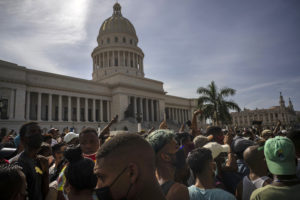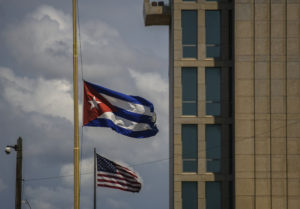By Geoff Thale and Clay Boggs
The Cuban government has announced significant changes to its migration policy. This change will permit most Cubans to travel abroad without seeking official approval. Most Cubans will no longer need an official exit visa or a letter of invitation from a resident in their destination country in order to travel abroad, effective January 14, 2013. The new law also more than doubles (to 24 months) the period of time that Cuban citizens can be abroad without losing Cuban residency. This is a big step forward in reducing state control over citizens' personal decisions.
These important reforms respond to the desires of Cubans on the island and Cubans living abroad, and they are one more step in reducing the interference of the state in the lives of ordinary Cuban citizens. The new law has been long-anticipated; in May 2012, Ricardo Alarcón, the President of Cuba’s parliament, raised hopes when he said that major changes to Cuba’s migration policy were only “weeks away,” but then Raúl Castro dashed these hopes shortly thereafter, declaring that the Cuban government needed more time to evaluate migration policy, and that changes would be introduced gradually.
Although it is not clear why Cuba chose this particular moment to announce the new law, the changes in migration policy will be welcomed by Cuban citizens. The new migration law is a sign that political reforms are taking place in Cuba, in tandem with the ongoing economic reforms.
Nonetheless, there are lots of unanswered questions, both on the Cuban side and about the implications for the United States. For example, it is still not clear which categories of professionals will continue to need exit visas, or how many individuals will still face restrictions. The law suggests that some highly qualified professionals, such as doctors, will continue to need some kind of official permission to leave Cuba. (The Cuban Medical Professional Parole Program in the United States, initiated in 2006 by the George W. Bush administration, encourages Cuban doctors working abroad to leave Cuban government service by offering them favorable immigration treatment).
Another unanswered question is whether the Cuban government will use political criteria to determine who needs an exit visa and who does not. The law says nothing about political conditions, only about restrictions on categories of professionals. Without an exit visa requirement, it is harder for the government to impose restrictions on individuals for political reasons. Yet the law does provide for some discretion about which individuals the government allows to leave Cuba. It will be a real test to see if dissidents, such as the blogger Yoani Sánchez, who has been repeatedly denied visas, are kept on a “no travel” list, or if they will finally be allowed to travel abroad without restrictions.
In Washington, Cuba's lifting of its travel restrictions will raise uncomfortable questions about the U.S. policy of permitting any Cuban who reaches U.S. soil to be paroled. This policy, commonly known as “wet foot, dry foot,” has always created incentives for Cubans to risk their lives by crossing the Mexican border or taking rafts across the Florida Straits. The perverse logic of this law now seems stranger than ever: while Cuba is allowing almost anyone who wants to leave to do so, the U.S. government will only allow some Cubans to immigrate legally, while at the same time automatically paroling any Cuban citizen who enters the U.S. illegally.
Ironically, the changes announced today mean that Cubans can travel to the United States without permission from their government, while U.S. citizens still need a license from the U.S. government in order to travel to Cuba.
What impact will these changes have on Cuban out-migration? It is unlikely that the changes will drive a mass exodus to the United States or elsewhere. Theoretically, a liberalization of travel rules could drive Cuban migration to those countries that do not require a visa from Cubans, particularly where these countries have strong economies. But it is not clear that many such countries exist in the Western Hemisphere. (Canada and Mexico require visas for visiting Cubans).
Overall, lifting the exit visa will put Cubans in a similar position to others in the Caribbean and Latin America: Cubans will be able to leave their country more easily, but it seems unlikely that many countries will allow them to legally immigrate. As Cuba continues a process of economic and political reform, its problems are looking less and less exceptional, and more and more like the problems of other Latin American and Caribbean countries.



